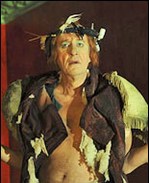SITE GUIDE
SEARCH
REVIEWS
REVIEW ARCHIVES
ADVERTISING AT CURTAINUP
FEATURES
NEWS
Etcetera and
Short Term Listings
LISTINGS
Broadway
Off-Broadway
NYC Restaurants
BOOKS and CDs
OTHER PLACES
Berkshires
London
California
New Jersey
DC
Connecticut
Philadelphia
Elsewhere
QUOTES
TKTS
PLAYWRIGHTS' ALBUMS
LETTERS TO EDITOR
FILM
LINKS
MISCELLANEOUS
Free Updates
Masthead
A CurtainUp Review
The Diary of a Madman
|
I shan't be going to the office today, Tuovi. I have to do something of far greater importance than the idiots there could possibly dream of.
— Aksentii Poprischin.
|

Geoffrey Rush
|
Propischin, insolvent and approaching middle age, suffers from a variety of real and imagined professional and personal indignities, acting out his delusions in a shabby attic room he sardonically refers to as "gentleman's lodging." To his unseen landlady below he rails from the top of the stairs about everything from the unavailability of candles to the paucity of dumplings in the evening soup. Hopelessly infatuated with his supervisor's daughter but completely outclassed, Propischin gradually elevates himself in his mind, eventually and famously fancying himself the king of Spain.
Rush is astoundingly physical as Propischin, and carries the two plus hours of this play effortlessly. Variously, he crows like a rooster, hits himself in the head as punishment for losing an umbrella, dances and falls about, contorts in agony and howls. He playfully nudges the fourth wall, from time to time, acknowledging the audience and the small orchestra in the eaves.
Are violin scratches noises in his head? Are audience chortles internal voices or subjects paying homage? The creators (Rush, Holman and director Neil Armfield) also successfully introduce foils (each played by Yael Stone) who are largely absent in the short story. Propischin mainly interacts with Tuovi, a Finnish servant who doesn't understand Russian and absorbs much of the endearingly mad Propischin's derision.
Catherine Martin's impeccable set design plausibly imagines Propischin's dreary quarters, replete with a sooty and leaky skylight, deep burgundy walls and a cold metal bed. A gigantic pile of papers sits stacked against one wall. The space becomes increasingly chaotic as Propischin spirals further downward. Tess Schofield's costume design appropriately tracks the distracted Propischin's increasingly alarming appearance. The orchestra supports the action with original music - playful, ominous and even cacophonous - by Alan John. Mark Shelton's lighting is exquisite, particularly at one moment where shadow is used to demonstrate Poprischin's feelings of inferiority to his haughty superiors.
David Holman's adaptation is first-rate and integrates so seamlessly with Gogol's legendary short story that at times it is difficult to tell the two authors' words apart. Holman even authentically plumps up Propischin's meeting with Sophia and it is everything we would expect: Propischin trips over his own tongue and accidentally sneezes into the woman's handkerchief.
No one does exasperation better than Rush. In his frequent moments of irritation, his voice displays a perfect balance of disgust, frustration and defiance. It's sheer delight to see the preoccupied Propischin tussle with and dismiss imagined fools and idiots, and even himself.
What Rush has done is to have brought to life and given flesh to a character Gogol had only essentially sketched with his short story. Rush, Holman and Armfield have expanded the character in a manner entirely worthy of its creator. And, despite their clear and major additions, Gogol's words are still foregrounded. They have made something which is at base quite serious — a mind's unraveling - humanly comic, without detracting from it. Indeed, Rush turns on a dime and becomes the agonized, tortured and confused asylum resident in the second act, woefully unsure where and who he is. While we have mostly laughed at Propischin's charming cluelessness to this point, Rush's stirring performance underscores the fact that we are watching someone's descent into what is ultimately a horrifying mental illness.
In an important and starling way, the creators of The Diary of a Madman have enhanced the original, as all great adaptations should.
|
The Diary of a Madman By Nikolai Gogol Adapted by David Holman with Neil Armfield & Geoffrey Rush Directed by Neil Armfield Cast: Geoffrey Rush (Aksentii Poprischin), Yael Stone (Tuovi, Sophia and Tatiana) Set Design: Catherine Martin Costume Design: Tess Schofield Lighting Design: Mark Shelton Sound Design: Paul Charlier Music: Alan John (after Mussorgsky) Running Time: Two hours and ten minutes, including one intermission Brooklyn Academy of Music (BAM) Harvey Theater, 651 Fulton Street, www.BAM.org From February 11 - March 12 Tues.-Sat. @ 7:30 p.m., Sat. 2 p.m. matinee; Sun. 3 p.m. matinee Reviewed by William Coyle, based on February 16 performance |
|
REVIEW FEEDBACK Highlight one of the responses below and click "copy" or"CTRL+C"
Paste the highlighted text into the subject line (CTRL+ V): Feel free to add detailed comments in the body of the email. . .also the names and emails of any friends to whom you'd like us to forward a copy of this review. Visit Curtainup's Blog Annex For a feed to reviews and features as they are posted add http://curtainupnewlinks.blogspot.com to your reader Curtainup at Facebook . . . Curtainup at Twitter Subscribe to our FREE email updates: E-mail: esommer@curtainup.comesommer@curtainup.com put SUBSCRIBE CURTAINUP EMAIL UPDATE in the subject line and your full name and email address in the body of the message. If you can spare a minute, tell us how you came to CurtainUp and from what part of the country. |

Slings & Arrows-the complete set
You don't have to be a Shakespeare aficionado to love all 21 episodes of this hilarious and moving Canadian TV series about a fictional Shakespeare Company






